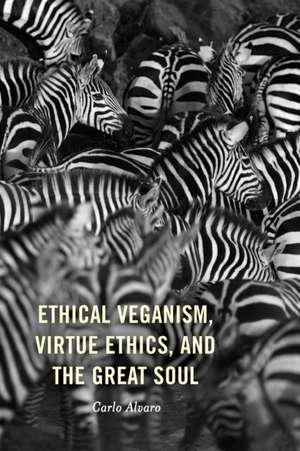Ethical Veganism, Virtue Ethics, and the Great Soul
Autor Carlo Alvaroen Limba Engleză Paperback – 4 mar 2022
Preț: 330.15 lei
Nou
Puncte Express: 495
Preț estimativ în valută:
63.18€ • 65.56$ • 52.81£
63.18€ • 65.56$ • 52.81£
Carte tipărită la comandă
Livrare economică 17-31 martie
Preluare comenzi: 021 569.72.76
Specificații
ISBN-13: 9781498590037
ISBN-10: 1498590039
Pagini: 214
Dimensiuni: 152 x 229 x 13 mm
Greutate: 0.36 kg
Editura: Lexington Books
ISBN-10: 1498590039
Pagini: 214
Dimensiuni: 152 x 229 x 13 mm
Greutate: 0.36 kg
Editura: Lexington Books
Cuprins
Preface
Acknowledgments
Introduction
Chapter 1: Kant, Animals, and Indirect Moral Duty
Kant, Marginal Cases, and Animals
What¿s Wrong with the Indirect Duty View?
Two Neo-Kantian Views
Chapter 2: Utilitarianism: All that is Gold does not Glitter
Some basic Tenets of Utilitarianism
Utilitarianism = Vegetarianism?
Conclusion
Chapter 3: Eating People and Eating Animals
Utilitarians and Animals
Eating Animals and People
Marginal Cases
Conclusion
Chapter 4: A New Horizon: Virtue Ethics
On Morality and the Discipline of Non-Aretaic Authorities
What is Virtue Ethics?
The Virtue Approach
The Components of VE
More Objections
Chapter 5: What about Our Treatment of Animals?
The Scope of Virtue
Animal Ethics Needs Virtue
Chapter 6: Veganism as a Virtue
Embracing Virtue
Some Tenets of Virtue Ethics
Four Important Virtues: temperance, compassion, fairness, and greatness of the soul
Eating Meat and the Destruction of the Environment
Conclusion
Chapter 7: Some Objections
Being Vegans is not for everyone
Where Do We Draw the Line?
Plants Suffer Too
Eating Meat is an Enjoyable Experience
Eating animals is natural
Animals Eat Other Animals
What about Tradition?
Religion Allows Meat
Eating Meat is Healthful
Chapter 8: Awareness: What we do to Animals
Awareness
Should We Become All Vegans?
The Link between Virtue and Veganism
Reaching People in Non-Manipulative Ways
Chapter 9: Ethical Veganism¿s Beef with Cultured Meat
Virtue and Objections
Ethical Veganism and Lab-Grown Meat
Abortion and Meat
Conclusion
Bibliography
Acknowledgments
Introduction
Chapter 1: Kant, Animals, and Indirect Moral Duty
Kant, Marginal Cases, and Animals
What¿s Wrong with the Indirect Duty View?
Two Neo-Kantian Views
Chapter 2: Utilitarianism: All that is Gold does not Glitter
Some basic Tenets of Utilitarianism
Utilitarianism = Vegetarianism?
Conclusion
Chapter 3: Eating People and Eating Animals
Utilitarians and Animals
Eating Animals and People
Marginal Cases
Conclusion
Chapter 4: A New Horizon: Virtue Ethics
On Morality and the Discipline of Non-Aretaic Authorities
What is Virtue Ethics?
The Virtue Approach
The Components of VE
More Objections
Chapter 5: What about Our Treatment of Animals?
The Scope of Virtue
Animal Ethics Needs Virtue
Chapter 6: Veganism as a Virtue
Embracing Virtue
Some Tenets of Virtue Ethics
Four Important Virtues: temperance, compassion, fairness, and greatness of the soul
Eating Meat and the Destruction of the Environment
Conclusion
Chapter 7: Some Objections
Being Vegans is not for everyone
Where Do We Draw the Line?
Plants Suffer Too
Eating Meat is an Enjoyable Experience
Eating animals is natural
Animals Eat Other Animals
What about Tradition?
Religion Allows Meat
Eating Meat is Healthful
Chapter 8: Awareness: What we do to Animals
Awareness
Should We Become All Vegans?
The Link between Virtue and Veganism
Reaching People in Non-Manipulative Ways
Chapter 9: Ethical Veganism¿s Beef with Cultured Meat
Virtue and Objections
Ethical Veganism and Lab-Grown Meat
Abortion and Meat
Conclusion
Bibliography
